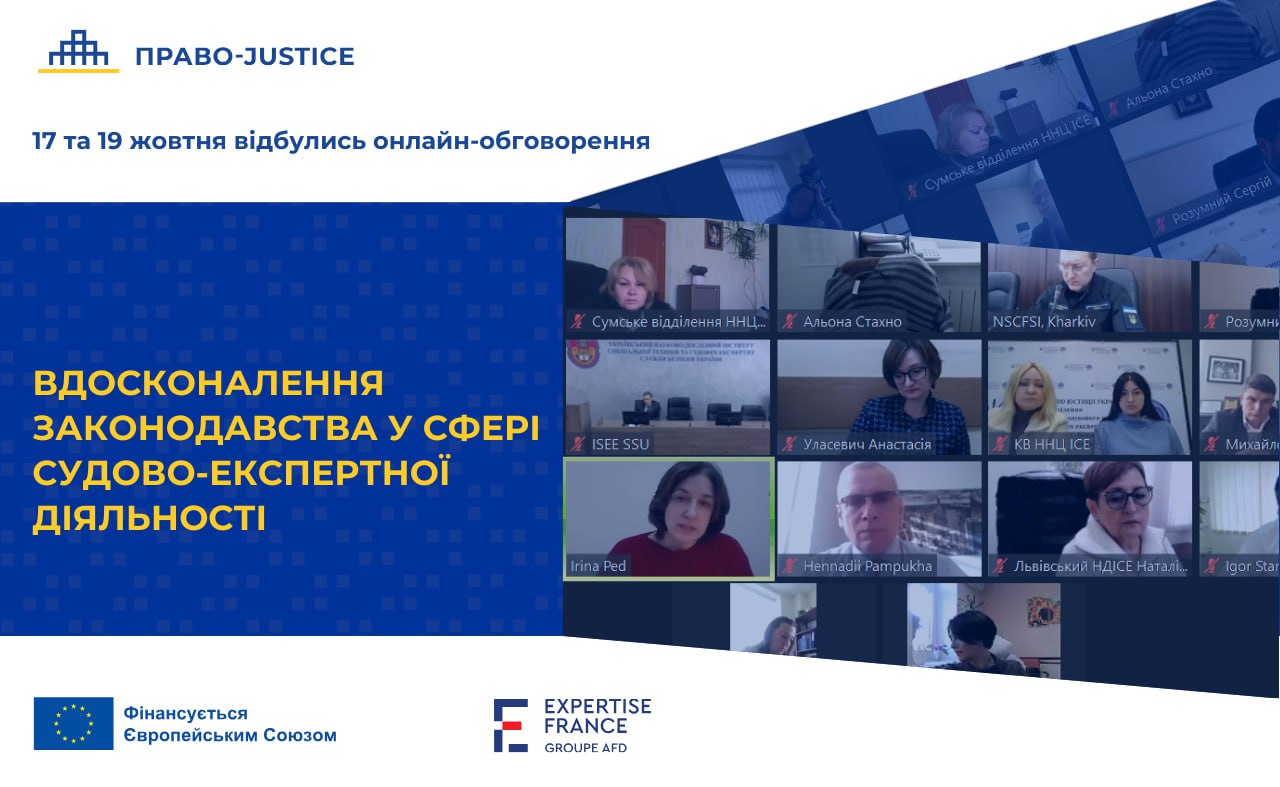Online Consultations on Improving Legislation in the Field of Forensics Took Place

As part of the regular annual monitoring of the implementation and analysis of the effectiveness of adopted legal acts, the Ministry of Justice of Ukraine held online consultations on improving legislation in the field of forensics. The heads and representatives of forensic institutions of the Ministry of Justice, the Ministry of Internal Affairs, the Ministry of Health, and the Security Service of Ukraine; private forensic experts; academia, and national experts of the EU Project Pravo-Justice joined the discussion.
The online consultations held on October 17 were devoted to improving the procedure for forming the composition of the Coordination Council on Forensics under the Ministry of Justice of Ukraine. Other issues raised included problems relating to the publication of decisions on disciplinary liability of forensic experts; certain aspects of digitization of forensic activity; the possibility of exercising forensic activity remotely, in particular, when the expert stays abroad.
“We want to have the opinions of stakeholders on the mentioned aspects in order to take them into account when further analyzing regulatory acts”, said Oleksandr Oliinyk, Director of the Directorate of Justice and Criminal Justice, Ministry of Justice of Ukraine, when addressing the participants to the discussion with a welcome speech.
As to the issue of improving the composition of the Coordination Council on Forensics under the Ministry of Justice of Ukraine, a significant number of forensic experts, who were present at the online discussion, expressed the opinion that the head of the Council should be appointed by the Ministry of Justice. In addition, the participants to the discussion voiced proposals as to the expediency of introducing quantitative census from the state expert institutions and private experts.
At the same time, there were quite different opinions regarding the possibility of publishing decisions on disciplinary liability of forensic experts. Some attendees spoke in favor of eventually publishing relevant decisions in a depersonalized format. In addition, it has been suggested that the information about disciplinary liability of a forensic expert be made public only after the expiration of the term of appeal or after all court procedures are duly completed. As an alternative, other participants suggested publishing regular summaries of disciplinary practice with practical recommendations for forensic experts.
The stakeholders could not agree either on the expediency of allowing forensic experts performing their professional duties remotely, in particular outside of Ukraine. Proponents of that approach said that forensic experts should be given such an opportunity, if the nature of the examination did not require the physical presence of an expert; or the transfer of test samples, etc. At the same time, conditions for the protection of sensitive information shall be provided.
In turn, the online consultation, which took place on October 19, was devoted to certain issues of digitization of forensic activity. In particular, the participants to the event discussed the registration of cabinets of forensic experts in the Unified Judicial Information and Telecommunication System; the exchange of electronic correspondence between a forensic expert, participants to the proceedings, and the court; as well as the related issues of transfer of materials (test samples) for research; estimation of the expertise duration etc. A lively discussion was provoked by to the problem of e-archiving. According to the participants to the online consultations, e-archiving cuts significantly the expenditures of forensic experts, however requiring additional information security measures being in place.